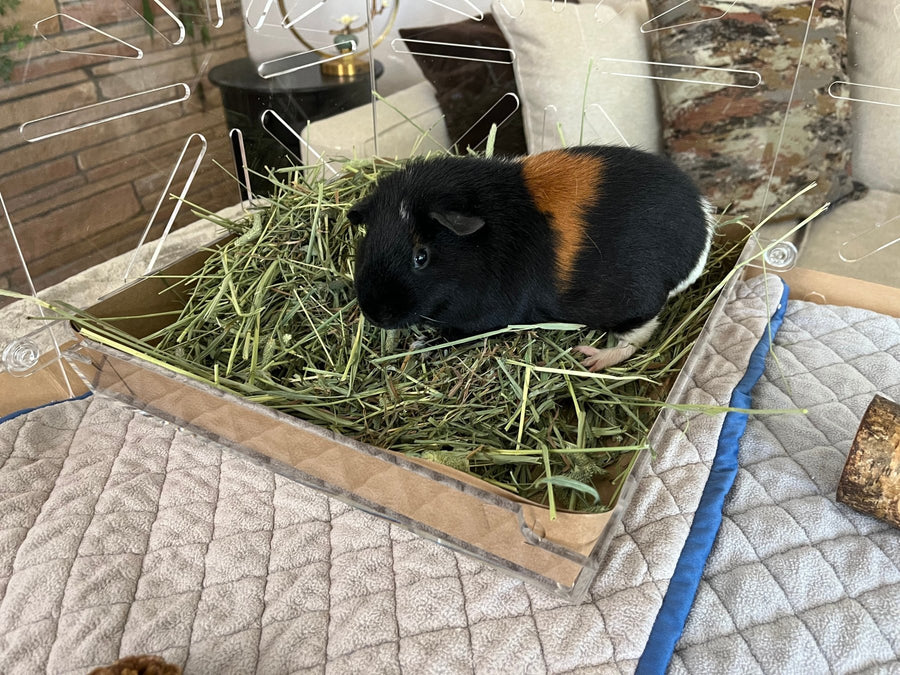Why Guinea Pigs Should Never Be Kept Alone: The Case for Companionship
If you're a guinea pig parent—or thinking about becoming one—you may be wondering if it's okay to keep just one guinea pig. While it might seem convenient, the truth is that guinea pigs are social animals that thrive on companionship. In fact, keeping a guinea pig alone can lead to loneliness, stress, and even physical health issues.
In this blog, we’ll explore why guinea pigs should never be kept alone, what happens when they are deprived of a friend, and some fascinating facts from around the world, like how Switzerland made it illegal to own just one guinea pig!
The Social Nature of Guinea Pigs
Why Guinea Pigs Need Friends
Guinea pigs, or cavies, are naturally social animals. In the wild, they live in colonies, relying on each other for comfort, safety, and companionship. They are constantly communicating with one another through vocalizations, body language, and even play. When you keep a guinea pig alone, you're denying them one of their most fundamental needs: social interaction with their own kind.
No matter how much time you spend with your guinea pig, you can’t replace the bond they would share with another guinea pig. Humans, while great caretakers, simply can’t mimic the way guinea pigs communicate and interact with each other.
Emotional and Physical Health Impacts
When guinea pigs don’t have a companion, they can become lonely and depressed. Signs of loneliness in guinea pigs include:
- Lethargy: They may stop moving around as much.
- Lack of Appetite: Lonely guinea pigs often lose interest in food.
- Excessive Vocalization: A lonely guinea pig might make more noise than usual in a call for attention.
In extreme cases, loneliness can even lead to physical health problems, including a weakened immune system, which makes them more susceptible to illness.
More Than Just Friends—They’re Family!
Guinea pigs form deep bonds with their companions. When kept in pairs or groups, they engage in grooming each other, playing, and sometimes even cuddling together when they rest. These are all behaviors that are essential to their emotional well-being.
Without a fellow guinea pig to interact with, they may become withdrawn or overly dependent on their human caretakers, which can lead to anxiety.
Fascinating Facts About Guinea Pig Companionship
Did You Know It’s Illegal to Own Just One Guinea Pig in Switzerland?
Yep, you read that right! In Switzerland, the law recognizes that guinea pigs are social creatures and requires that they be kept in pairs or groups. Keeping just one guinea pig is considered animal cruelty, and there are even services that help match guinea pigs with companions if one of their cage mates passes away.
Guinea Pig Retirement Homes Exist in Europe
Switzerland isn’t the only place where guinea pigs are given special treatment. In parts of Europe, there are actual “old age” homes for guinea pigs whose companions have died, or who are too elderly to be adopted. These retirement homes ensure that no guinea pig has to live out their golden years in solitude. It’s a heartwarming reminder of how important companionship is for these animals.
The Problem With Keeping Just One Guinea Pig
Behavioral Issues
Guinea pigs that are kept alone are more likely to develop behavioral problems. Without a companion to interact with, they may become:
- Bored: A lonely guinea pig will often stop playing or exploring their habitat.
- Stressed: Guinea pigs kept alone can develop anxiety, which may manifest as chewing on cage bars, pacing, or excessive grooming.
These behaviors are not just signs of boredom—they're indications of distress. A guinea pig that is lonely or stressed can have a shorter lifespan and is at risk of developing more serious health problems.
More Guinea Pigs Doesn’t Mean More Trouble
Some guinea pig parents worry that having more than one guinea pig will be too much work. But the reality is that guinea pigs are easier to care for when they’re happy and healthy—and happiness comes from having a companion. You won’t necessarily need to do twice the amount of work with two guinea pigs; in fact, you may find that they entertain each other, which could actually make your life a bit easier!
Practical Tips for Adding a New Guinea Pig
If you currently only have one guinea pig, it’s never too late to introduce a companion! However, there are a few things to keep in mind when doing so:
- Quarantine: If you're introducing a new guinea pig, it’s a good idea to quarantine them for a short period to ensure they don’t carry any diseases or parasites.
- Gradual Introduction: Allow your guinea pigs to get to know each other slowly. Start by letting them see and smell each other through a barrier, and then slowly allow more interaction.
- Neutral Territory: Introduce your guinea pigs in a neutral space where neither will feel territorial.
When adding a second or third guinea pig, just be sure you have enough space for everyone to live comfortably. (This is where you could expand your existing habitat—our expansion kits make it easy!)
Final Thoughts: Guinea Pigs Are Happier Together
Guinea pigs are not meant to live in isolation. Their mental and physical well-being depends on the bonds they form with their companions. Whether you’re a first-time guinea pig parent or you’ve had one for a while, consider adding a friend to their habitat. You’ll not only see a boost in your guinea pig’s happiness, but you’ll also notice a more playful, active, and healthy piggy!









Leave a comment